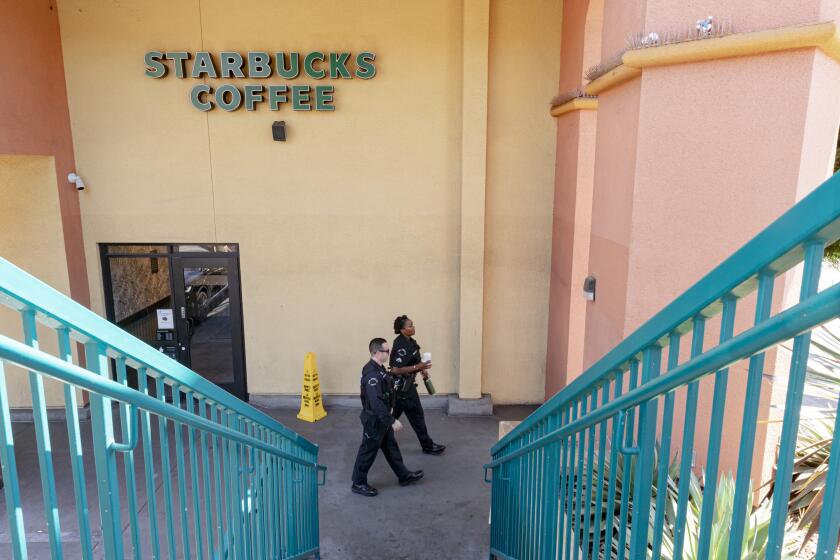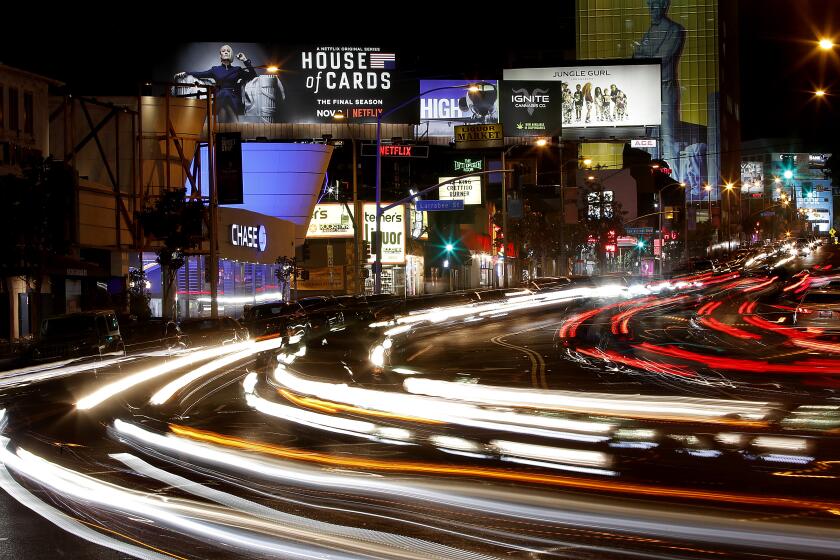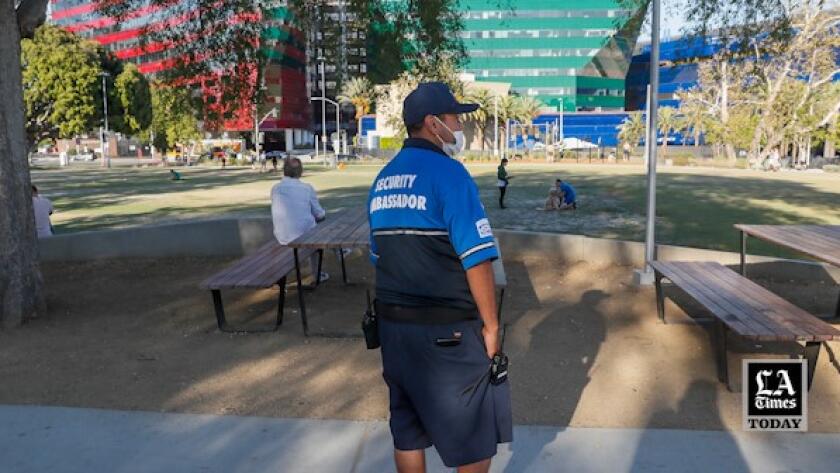West Hollywood cut a few sheriff’s deputies. It fueled a national firestorm on crime, defunding
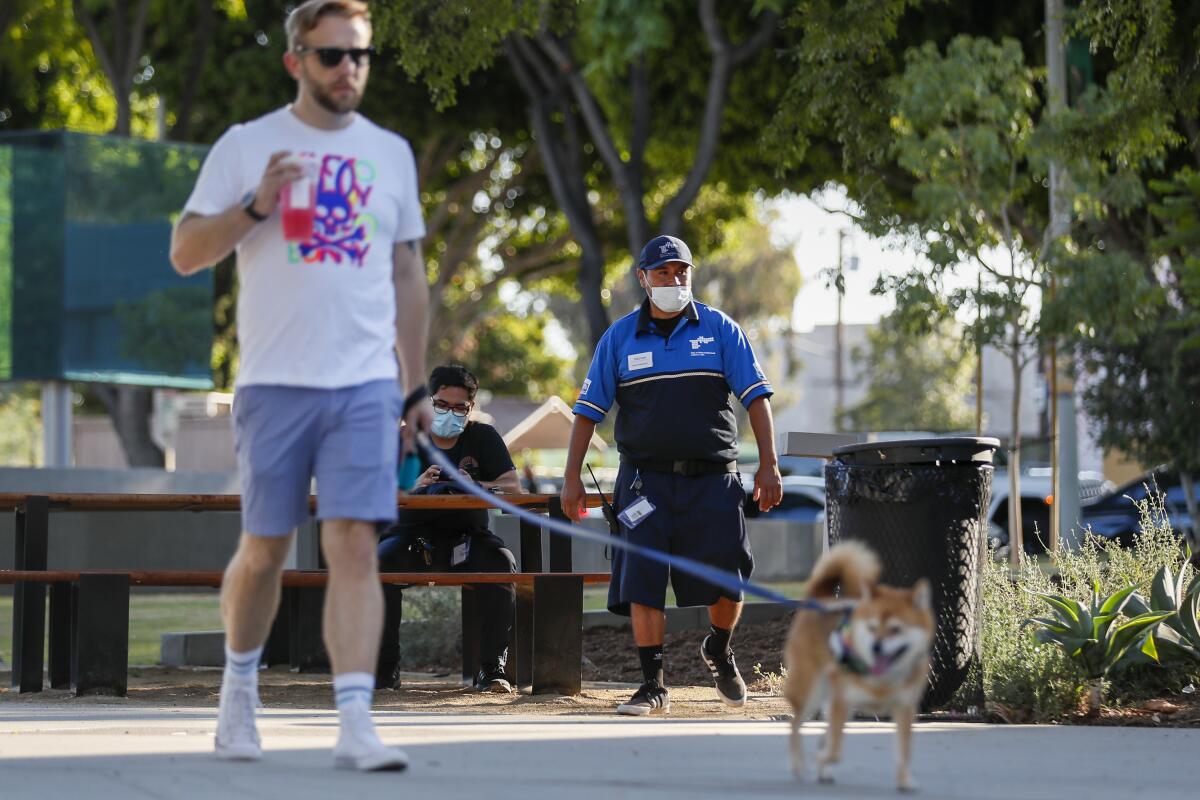
If you were to listen to Fox News, Los Angeles County Sheriff Alex Villanueva and felon O.J. Simpson, you would think West Hollywood is under assault.
They say crime is out of control, residents are cowering in their homes, and the blasé West Hollywood City Council just made the place more dangerous by voting to defund the Sheriff’s Department.
If you listen to activists on the left, the City Council is keeping far too many armed deputies on the streets, and those who think differently are being swayed by right-wing “copaganda.”
Reality, of course, is more nuanced.
The City Council voted in late June to reduce the number of deputies in the West Hollywood sheriff’s station gradually and to increase the number of unarmed security guards — dubbed “ambassadors” — patrolling the streets. Their action has placed the city on the front lines of the culture wars.
While many Starbucks customers and workers said they understood concerns around stores given the worsening homelessness crisis and an uptick in crime, some questioned the decision.
The decision in this famously liberal city — a renowned LGBTQ enclave and home of the Sunset Strip — has become symbolic precisely because it involves some of the most charged issues in America this election year: The role of law enforcement. Crime. And homelessness.
“We’re reimagining public safety, period. In a very pragmatic, incremental manner,” said West Hollywood Mayor Pro Tem Sepi Shyne, who supported the deputy reduction as part of a 3-2 vote. “This is a way to do something a little different that a lot of our residents, once they actually get through the hype and look at what we’re doing, have agreed with.”
Meanwhile, Villanueva — the cowboy-hat-wearing sheriff who complains about “wokeism” and is facing a tough runoff election in November — blasted the plan, saying it was the work of “special interests.”
“This is a reckless decision by the board and those who are out of touch with what our citizens care most about: reducing crime, finding a solution to the homelessness crisis, increasing safety and well being, and restoring West Hollywood and LA county to a destination to live and visit,” Villanueva wrote on Facebook.
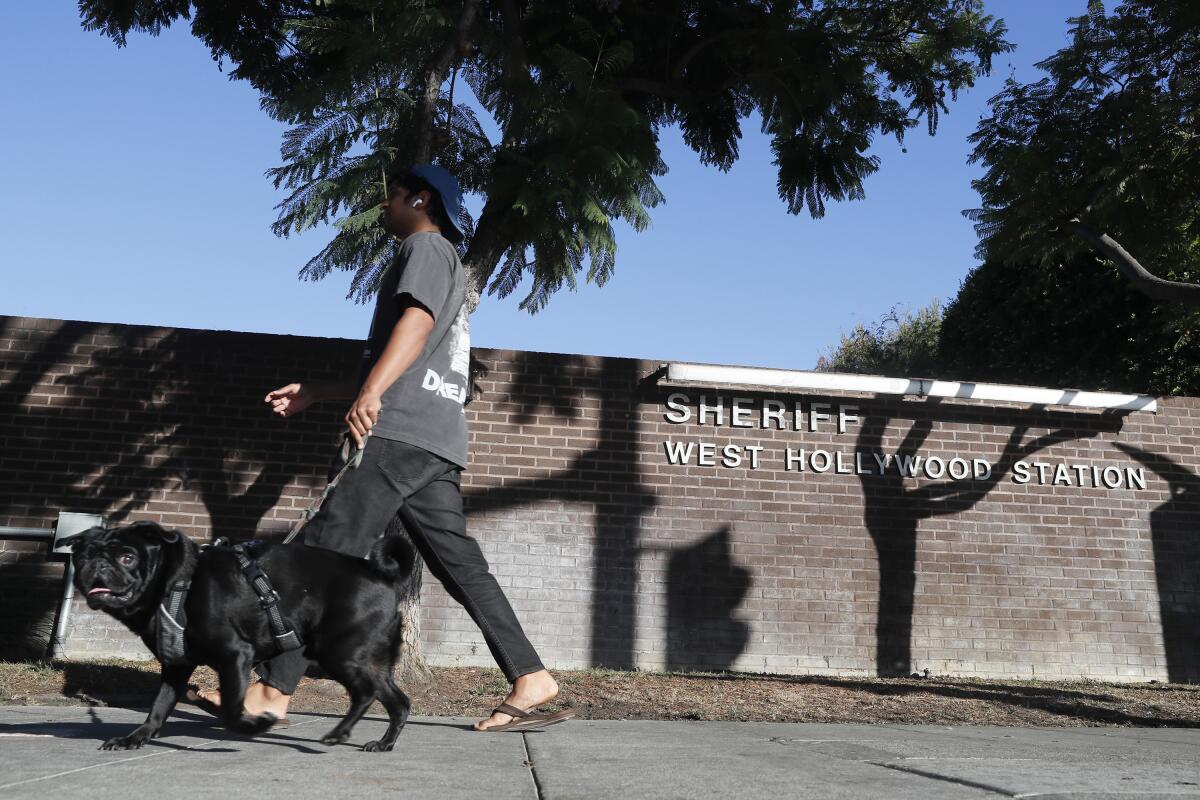
Simpson weighed in on Twitter: “I spent a little time in one of our institutions, and, trust me, we need police. We need the sheriff’s department.”
On the Fox News talk show “Outnumbered,” commentator Pete Hegseth joked: “Help, I’m being mugged! Somebody call the unarmed ambassador.” Co-host Emily Compagno, not joking, claimed West Hollywood residents are being “stalked by gangs back to their front doorsteps and being brutally assaulted.”
So what is really happening with crime and law enforcement in West Hollywood?
As of last month, the city’s sheriff’s station had 60 sworn deputies.
The City Council voted on June 27 to add one deputy, starting July 1, to an entertainment policing team focused on nightlife and alcohol-related problems.
Within 90 days, in approximately late September, the number of deputies is to be cut by two. That will leave 59 deputies — a net loss of one since the vote.
City staff will monitor crime data to evaluate the impact of the staffing changes and, in six more months — spring 2023 — the City Council will consider cutting up to three more deputies.
There will be a net loss of, at most, four deputies over the next nine months.
At the same time, the city will add 30 unarmed security ambassadors from the company Block by Block, which has worked in the city since 2013.
Wearing matching blue shirts, they will do bicycle and foot patrols in commercial corridors and parks and along residential streets. Each position is expected to cost about $70,000 a year.
“We’re not there to replace the sheriffs,” said Blair McBride, president of Block by Block. “Our ambassadors are unarmed, but they’re there to be sort of a force multiplier and be an extra set of eyes and ears for the police.”
McBride said they are trained to de-escalate if someone, such as a homeless person, is having a mental health crisis.
If ambassadors see a crime happen, they’re not to engage suspects, but rather get a good description, identify witnesses and call the Sheriff’s Department.

West Hollywood, a 1.9-square-mile city of 35,000 residents, has contracted with the Sheriff’s Department since it incorporated in 1984.
As the first city in the nation with an openly gay majority on the City Council, it grabbed international headlines, for better or worse, at a time when LGBTQ people felt much less safe outside established “gayborhoods.”
Over the years, complaints that deputies were harassing gay residents and discriminating against LGBTQ employees within the department’s own ranks fueled calls for a municipal West Hollywood police department. But it was always cheaper to contract with the sheriff.
The relationship between deputies and those who live in the city has generally improved in recent years, residents told The Times, in part because of strides within the department for more outreach and cooperation with gay communities. Deputies with the West Hollywood station now drive patrol cars with the rainbow-striped city logo emblazoned on their doors.
The cost of the sheriff’s contract, though, has skyrocketed.
Residents — as well as activists who want to defund law enforcement — have been arguing over whether the city is being ripped off, especially because some types of crime, such as theft, are rising.
In 2012, the city paid $12.4 million for 67 deputies. Last year, it paid more than $20 million for 60 deputies — an average of about $330,000 per deputy, according to a Sheriff’s Department report.
“It’s really expensive,” said Marcel Rodarte, executive director of the California Contract Cities Assn., adding that the average figure covers training, administrative overhead and pensions. “It’s why it’s the biggest line item for just about every city.”
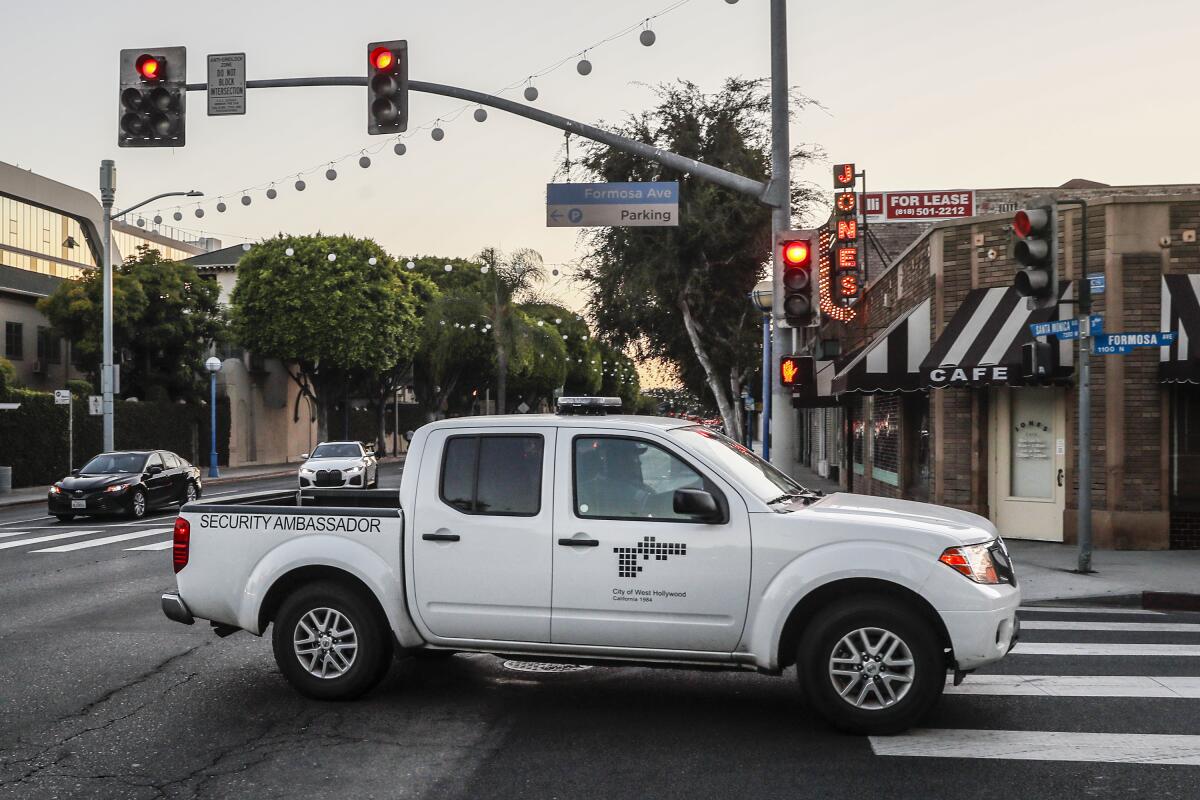
Discussions over staffing levels this year have echoed the national “defund the police” movement, which arose after the murder of George Floyd. Those who support defunding the police want to shift resources from law enforcement budgets and use the money to pay for social services.
“A new language emerged, which has trigger words for everyone on every side of this issue,” said Councilman John D’Amico, who voted to reduce the number of deputies.
Of the phrase “defund the police,” he said, “I’m carefully not saying it,” because the words are divisive and don’t accurately describe what the council is trying to do.
Mayor Lauren Meister, however, voted against the deputy reduction, and she said she keeps hearing from furious residents concerned about crime.
“It’s always been about making sure that we have police visibility, that the sheriffs are seen in the neighborhoods and seen in the commercial streets. That’s when people feel safer.”
She said she was happy to increase funding for much-needed social workers to engage with unhoused people. But she does not think unarmed security ambassadors will actually deter criminals.
West Hollywood is a progressive place, she said. But “liberal doesn’t mean defund.”
For months, young progressive activists, who belong to organizations such as JusticeLA, have shown up at local meetings to demand the sheriff’s budget be cut. They drew the ire of some longtime residents, who said they were outsiders ignoring the legitimate safety concerns of people who actually live in the city.
The city is one of seven that could be part of a pilot program to extend alcohol sales under Senate Bill 930, which must be approved by the state legislature.
In February, the West Hollywood Public Safety Commission, an advisory board appointed by the City Council, made a controversial recommendation: reduce the sheriff’s contract by more than $3 million, or about 10 deputies, and redirect the money to social services.
Public Safety Commissioner Nika Soon-Shiong, the daughter of Los Angeles Times owner Dr. Patrick Soon-Shiong, said that while she thought the City Council’s vote was pragmatic and fiscally responsible, it could have gone further.
“As the city spends more and more money on the sheriff contract, the expectation would be that people are feeling increasingly safer and that crime is going down at the same rate that the cost of the contract is going up,” said Soon-Shiong, who has been raising questions about spending on the Sheriffs Department and what the city is actually getting out of it. “And that’s not happening.”
Public perception of safety is low, she said, and “what is incredibly powerful is the feeling of fear.”
“It’s very difficult to counter fear with facts,” Soon-Shiong said. “But the reality is that crime in West Hollywood is at pre-pandemic lows.”
That’s correct if comparing 2019 with 2021, the last full year of crime statistics. However, if comparing the first half of 2022 with the first half of 2019, crime levels have risen, according to Sheriff’s Department statistics.
Mayor Pro Tem Shyne called the incremental deputy reductions “a compromise.”
The City Council also increased funding for social services by $1 million and is considering decreasing the number of sheriff’s deputies during LGBTQ Pride events and replacing them with Block by Block ambassadors.
But the decision to cut even a few deputies was so polarizing that councilmembers have been inundated with messages from across the country, Shyne said.
Shyne is the first queer woman of color elected to the City Council. She has gotten violent threats since the vote, some of which she has reported to law enforcement.
Messages have included anti-LGBTQ slurs, and some said she should be robbed and carjacked. And, she said, a community member said councilmembers should be locked in a room with criminals who have knives.
“We are all part of this community,” she said. “We are all public servants. We all love and care for West Hollywood, and the vitriol and the nastiness really is a lot of toxicity that, frankly, needs to stop.”
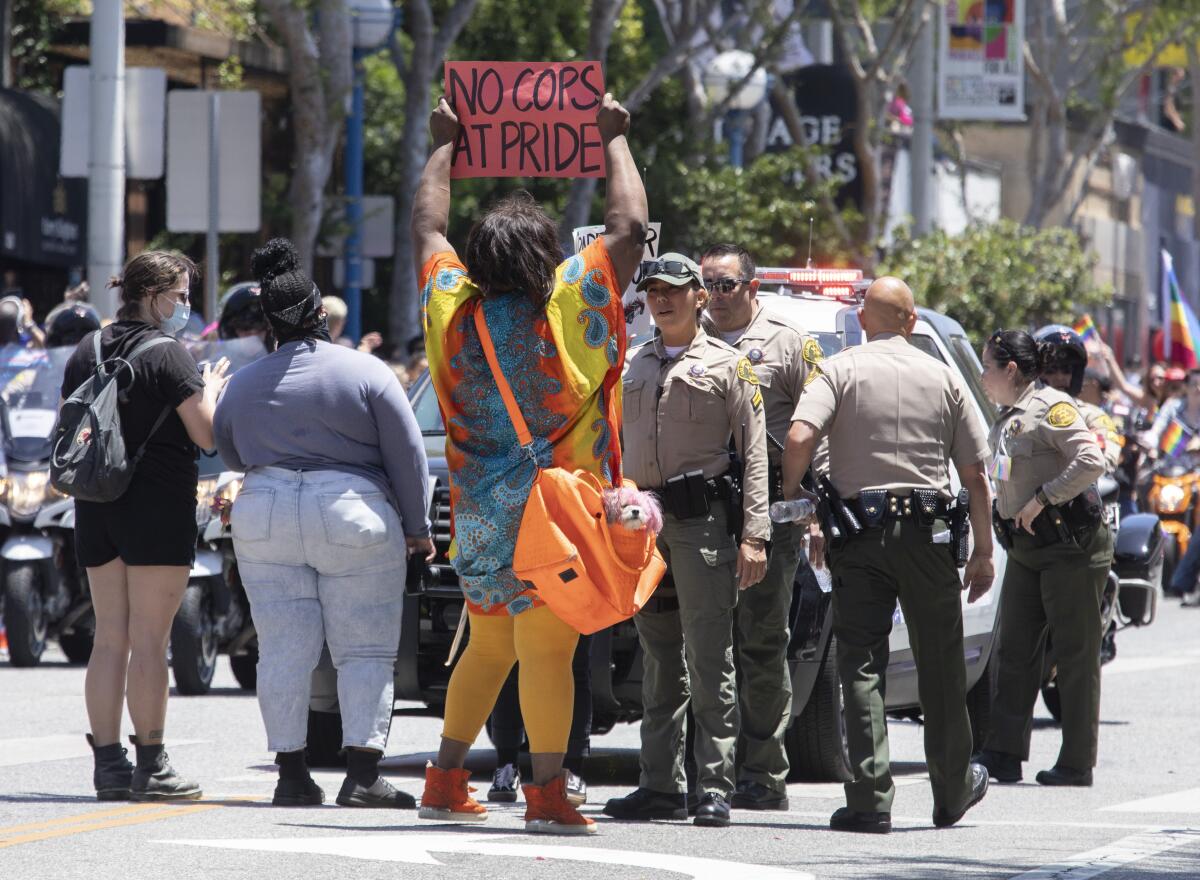
Whether West Hollywood is — or feels — more dangerous is up for debate.
Villanueva said on Facebook last month that crime there spiked 137% over the last year. But that figure is a comparison of a single month in 2021 to a single month in 2022.
Statistics on the Sheriff’s Department website show that violent and property crime stationwide, which includes the city and a small unincorporated county area, have increased from January through May of this year when compared with the same period last year. Violent crime went up 32%, from 96 to 127 incidents, and property crime went up 126%, from 469 to 1,062 incidents, according to Sheriff’s Department data.
The largest jump during the same period is in thefts, which rose from 299 incidents stationwide last year to 834 this year.
There were 137 pickpocket thefts at eight of the city’s popular bars and clubs in January and February alone, according to a Sheriff’s Department report. Robberies went up from 34 in the first five months of 2021 to 46 in the same period this year, while aggravated assaults rose from 52 to 74.
D’Amico said crime levels are similar to what they were just before the pandemic, and that many reported thefts now are of expensive smartphones.
D’Amico said he has had conversations with deputies in the West Hollywood station who have complained they spend too much time dealing with the city’s growing unhoused population. He said his hope was that, by adding security ambassadors, it would free up deputies to do their job: solving and preventing crime.
Bottom line, he said, “there is no defunding” this year.
Yes, the City Council is cutting a few deputies, he said, but it also approved cost of living increases and maintained $900,000 for supplemental patrols to be used as needed.
“We gave them a haircut and hair extensions at the same time,” D’Amico said.
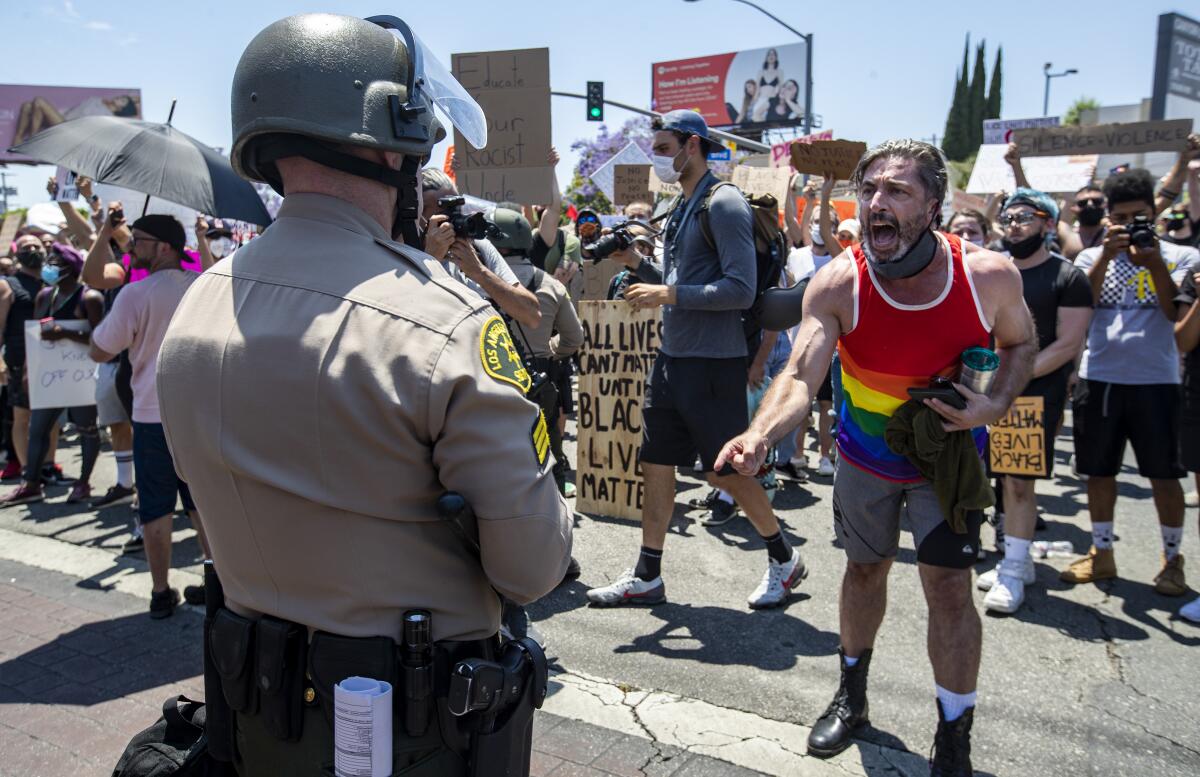
Residents have mixed feelings about cutting deputies — though people on both sides of the issue say the decision feels political.
Polly Businger, who has lived in West Hollywood for four decades, said that homes have been broken into in her neighborhood, and that it is no comfort to be told that theft is driving the rise in crime.
Theft is “a big deal if you’re scared out of your wits,” Businger, 78, said. She used to walk at night. Now, she’s too afraid.
“I’m uncomfortable with 30 so-called ambassadors that ride around on bicycles and have no defense. ... I don’t know if their presence is going to have the same deterrent effect as seeing a police car.”
Daniel Haran, a high school teacher who has lived in West Hollywood for 23 years, called the vote “a response to the ‘defund the police’ movement,” and said he won’t be surprised if the City Council changes its mind as soon as public opinion changes.
Haran, 58, noted that the City Council also just voted to allow some bars in West Hollywood to participate in a pilot program that would let them stay open until 4 a.m. He figures that will lead to more brawls, he said while having coffee outside a Starbucks on Santa Monica Boulevard.
“The pendulum goes back and forth. As soon as these bars are open late, I think they’ll cancel all of it,” he said of the deputy reductions.
“Right now, it’s the cool thing to cut the police,” added his friend, Kevin Neace, 56, another longtime resident.
Both said that they did not think it was a great idea and that, while it’s good to give money to services to help homeless people, often that money is hard to track and does not produce tangible results.
On the basketball court at West Hollywood Park, younger residents and visitors said they supported scaling back law enforcement, if it’s done thoughtfully.
Jerin Oberdorf is a 33-year-old music producer who grew up in a conservative part of Pennsylvania and moved to West Hollywood two years ago. He said it would help everyone — including deputies — to cut a few law enforcement officers and add more unarmed people whose job it is, specifically, to de-escalate in situations like mental health crises.
“There’s a problem where you have most police officers carrying an enormous bag of duties that are put on them,” Oberdorf said. He hopes the action taken in West Hollywood will help.
“I kind of wish the ‘defund the police messaging’ was a little better,” he added, “because I think that’s the goal. They’re trying to help these police officers not have to carry so much ... and put that for other people who are more qualified to not have their guns drawn.”
“If somebody’s having a mental health crisis, we don’t need to have an officer show up with a gun drawn,” added his friend, Chowdhury Yeethmam, who lives in Little Bangladesh, a neighborhood near Koreatown, but spends much of his free time in West Hollywood.
Yeethmam, a 25-year-old rapper, called West Hollywood an “opulent neighborhood” that feels safer than other areas. He thought the City Council’s action sounded like a step in the right direction.
“There’s extremes on both sides,” he said. “To get completely rid of police is insane. And to just fully, blindly support police is also insane to me.
“Me personally, I believe in defunding the police — but not to the point where they don’t have any equipment or anything like that.”
Watch L.A. Times Today at 7 p.m. on Spectrum News 1 on Channel 1 or live stream on the Spectrum News App. Palos Verdes Peninsula and Orange County viewers can watch on Cox Systems on channel 99.
More to Read
Sign up for Essential California
The most important California stories and recommendations in your inbox every morning.
You may occasionally receive promotional content from the Los Angeles Times.
